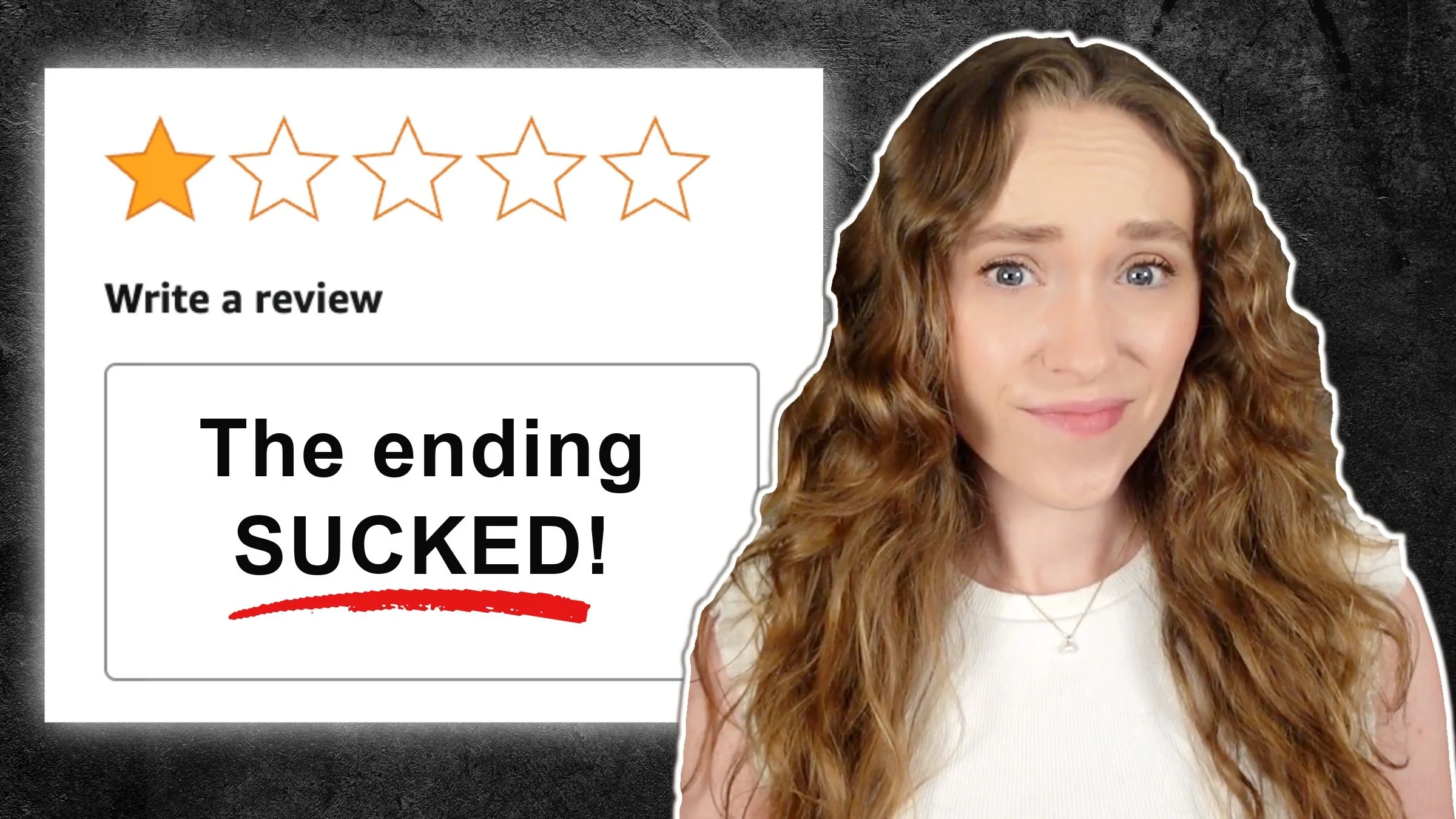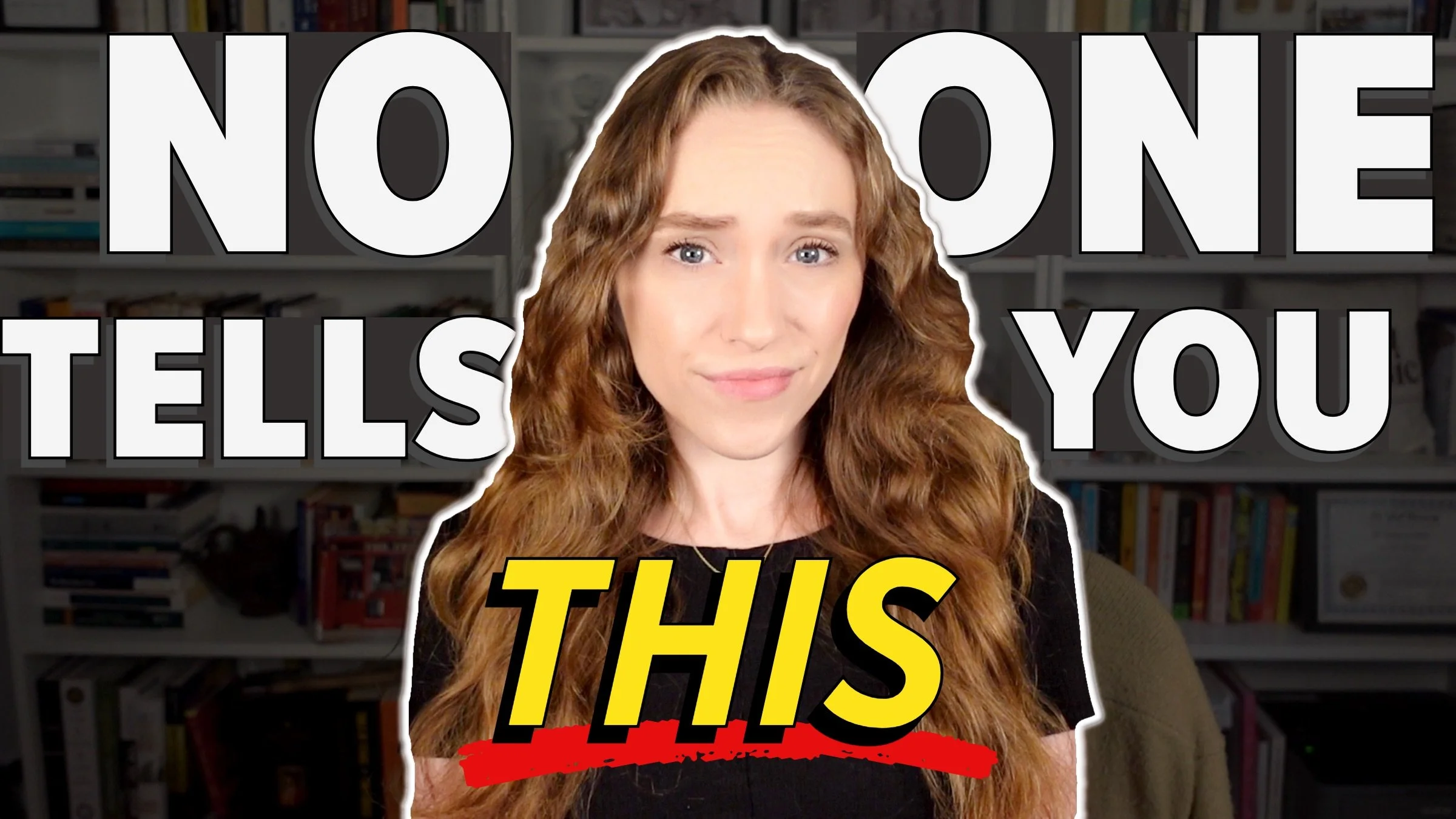9 Critical Lessons to Kickstart Your Writing Career
HIT PLAY OR READ THE POST BELOW:
Most writers fail not because they aren't talented, but because no one told them about all the invisible hurdles between writing a book and publishing it — like rejection, impostor syndrome, and the feeling that the publishing industry is slamming every door in your face.
These brutally honest lessons might sting, but they’ll transform your writing career if you take them to heart. Each of these lessons comes straight from interviews I've done with literary agents and traditionally published authors in my weekly newsletter, Chapter Break. These are people who know the inner workings of the industry and who have been in your shoes and come out on the other side of it. So, if you're ready for some real talk about what it actually takes to make it as a writer, let's dive in.
1. Reframe rejection into something normal rather than personal.
Learn to reframe rejection into something normal rather than personal. Everyone has constraints put on them. Editors might love your book, but it's not their imprint's brand. It's not personal. Salespeople might love your book, but the profit and loss statement doesn't work out to benefit the publisher. It's business.
— Heather Cashman, senior literary agent at Storm Literary Agency
Even if you know rejection isn't personal, it still feels personal every single time — because your book is personal. You came up with this story. You care about sharing it with the world. Otherwise, you wouldn't be putting yourself out there like this. Your characters might even be based on you or people that you know. You're the one who stayed up until 3:00 a.m. typing words on your laptop in secret. So, how could it not feel personal?
But as harsh as this sounds, when a literary agent or a publisher is considering your book for publication, it's not about you. It's simply about whether your project makes sense from a business perspective. When I worked at Penguin Random House, I saw fantastic manuscripts get passed on because they didn't fit the editor's list or because the sales team didn't see the vision. That doesn't mean the book wasn't worthy. In many cases, it found a home somewhere else that was a better fit.
So, try your best to reframe rejection as redirection. Every no gets you closer to the right yes.
2. Novels are built in the revision stage.
Novels are built in the revision stage. For me, that means the outline is the map. The first draft is the scaffolding, and then each revision is a new pass of the story where I'll build one element. Maybe it's a certain character's POV. Maybe it's just a focus on dialogue, or maybe it's weaving an ethical question or theme into the narrative.
— Lauren Ling Brown, author of Society of Lies (Reese's Book Club pick)
As a developmental editor, I absolutely love this point because it speaks to the transformative power of revision. Spoiler alert: your first draft probably won't be brilliant. And that's natural and normal. You need to go through the revision process to discover and then refine the story.
I love Lauren's metaphor here, and that's exactly how I think about first drafts. That first draft is really the framework of the house that you're building. Revision is where you put in all the flooring, paint the walls, and make it livable.
So, don't feel bad if you have a crappy first draft on your hands. Every book you love started out this way, and it's only going to get better and better from here. After all, great books aren't written — they're rewritten.
3. No one else will respect your writing time.
No one else will respect your writing time unless you put your foot down — including life. There will always be other events, responsibilities, etc., and most of them are important. You can't just skip out on your kid's play or ignore your bills. So, you work around it, which often means long hours, firm boundaries, and giving up some hobbies.
— Allison Gunn, the author of Nowhere
I've worked with way too many authors over my career who are immensely talented but let their writing projects fall by the wayside because they just can't seem to find the time to write. They keep pushing it off — "I'll write if I have time after dinner" or "I'll write once my kid goes to school and I have more time." But the reality is that you will never find the time to write. You have to take it.
And here's the brutal part about it: taking the time to write often means making some kind of sacrifice. If you're serious about getting the work done, you have to fit it in. Full stop. If you wait around for ideal conditions, you'll probably never write at all, and your story will die.
New York Times best-selling author and actress Katherine Steedman drafted her debut novel, Something in the Water, during the downtime she had on set. So, work writing into your schedule however you can, and honor that time.
4. Every publishing success story involves bumps in the road.
Almost every publishing success story involves some bumps in the road. I'm particularly proud of one of my writers whose book was on submission for almost nine months before finally landing with the perfect editor. It was a tricky project because it took a slightly unconventional approach to genre, but both the writer and I believed in it so strongly that we kept going until we found an editor who got it the same way that we did. Now, it's going to be one of the publisher's lead titles next year, and I can't wait for readers to get their hands on it.
— Maggie Cooper, agent at Aevitas Creative Management
There's a misconception in publishing that once you sign with a literary agent, your author career is made. That's not actually the case. Agents sometimes struggle to place books with editors at publishing houses for the same reasons authors struggle to find literary agents — the timing is off, the market shifts, or it's just not a fit.
Being on submission (which is when your manuscript is being considered by editors at publishing houses) can be as brutal as querying. And like querying, it can involve a long waiting period. You might start to question everything: Was my pitch wrong? Is my book even sellable?
But Maggie's story proves that the right publishing partners — the people who get what you're trying to do with your story, who love it as much as you do, and who will fight for it — are worth waiting for. Keep believing in your project, even if you can't see the light at the end of the tunnel just yet.
5. Most authors face imposter syndrome.
Most authors have some point in their careers where imposter syndrome becomes a real problem. If you're not confident in your writing and you get wrapped up in negative reviews or subjective feedback, it can feel debilitating. How can you create something when you feel like your work isn't worthwhile? Writers almost always experience setbacks in their careers, and we tend to attribute those setbacks to our own failures — not outside factors beyond our control.
— Lindsey Duga, author of Royal Heirs Academy
If you've ever thought, "I'm not good enough to be a writer," welcome to the club. When you feel that spiral starting, pause. Look at the facts — all the pages you've written, the readers who've loved your story, all the progress that you've made. Most people say they want to write a book sometime in their life, but very few actually do. You are one of those select people who have made an incredible achievement.
So, don't let any setbacks that you encounter along the way somehow convince you you're not a real writer. As long as you write, you are a writer. And in fact, if you're feeling impostor syndrome, that only further proves that you are a real writer.
6. The process never ends.
The process never ends. There truly hasn't been a single point in my six-year journey as an author where I felt like I could sit back and relax. This brings me back to my previous point about how important it is to find joy in the process. I've realized that as long as I get to spend time telling the stories I want to tell, everything else that comes with the publishing process is worth it.
— Daniel Aleman, author of I Might Be in Trouble
We all crave that moment of "I've made it" — the book deal, the multi-city tour, the bestseller badge. But here's the brutal truth: there is no finish line in publishing. It's a race that just keeps going and going. So, you need to maintain a pace that's sustainable.
Even the best-selling authors I work with feel the pressure of the next big idea, the next book launch, the next round of edits. That's why finding joy in the process itself is critical to avoid burnout. So, when you're starting to feel that stress begin to mount, return to why you started writing in the first place. What brings you to the page time and time again? Try to recapture that creatively energizing feeling it gives you. And once you do, don't let go of it.
If you're struggling to find the joy in writing, try just freewriting, or changing your scenery, or experimenting with a passion project. Writing might become your full-time job one day, but it should still feel like fun.
7. You just have to put in the words.
Just put in the words. Quite famously, Graham Greene wrote 500 words a day. And once he hit that number, he would just put his work aside. He managed to write quite a few novels with that steady, clock-like pace — and a handful of those books are truly great. Some of my most favorite novels.
As a practitioner, I fall short of Graham Greene's model. There are days when I write nothing. And on days when things are humming, I will keep writing for as long as the words come. But I swear by the essence of his technique, which I take as this: write without judgment, expectation, or self-importance. Keep at it, but know when to stand up and walk away.
— Bryan VanDyke, author of In Our Likeness
Don't overthink your writing process, especially when you're working on a first draft. Some days you'll write 2,000 words and feel unstoppable. Other days, it'll be 200 words that barely make any sense — that you end up trashing. And some days, it'll be zero words. It all counts, and it's all worthy.
Give yourself permission to be imperfect on the page, because striving for perfection is a guaranteed way to get nowhere. A trick I love to encourage this is to name the document where you're working on your draft something playful, like "Playground" or "Draft Zero" or "Brain Dump." That makes it feel less serious and formal, and allows you to prioritize progress over polish.
8. You should think about your story every day.
Think about your story every day, whether you're able to write or not. Spend time with it. Feed it little crumbs — even if you can't get any words down — to keep it alive and screaming for your attention. Have an idea for a scene, but you're commuting? Use the voice-to-text function in the Notes app to get it down. See a weird-looking bird? What would your protagonist think about it? Wait, would your protagonist even notice it?
Little thought exercises like these count as writing because it's you exploring your story and its world.
— Erin Cotter, author of A Traitorous Heart
I firmly believe that there is so much more to writing than physically putting words on a page. Writing is also thinking. It's also observation. It's also dreaming about your characters. It's also letting the story marinate in your mind while you wash the dishes or walk the dog.
Erin’s quote is a reminder to stay creatively energized and engaged with your story, even on those days when your word count is zero. Because if you keep your story and your characters and your world alive in your mind every day, when you do sit down to write, the words will flow so much faster.
9. Listen to feedback even if you disagree.
Even if you disagree with a comment that someone — a member of your writing group or workshop, a friend, or even your editor — makes on your manuscript, try to give it some consideration. It is often the case that there is a problem in a spot they've indicated, but their assessment of just what's going on isn't quite right. The diagnosis may be off, but there is probably still something there to be altered and improved.
— Sarah Perry, author of Sweet Nothings: Confessions of a Candy Lover
Here's what I think as an editor: you are 100% allowed to disagree with feedback. This is your story first and foremost, and every creative decision is ultimately yours — even if you work with a publisher. But Sarah's point is a really important one. Don't throw constructive criticism out the window just because you disagree with it at first. Really think about it.
If someone flags a scene or element of your story that isn't working, their suggestion for fixing it might not resonate with you, but this is still a gold mine of intel for you as the author. The simple fact that they brought it up as a potential problem is a very useful signal that you should use. Feedback tells you how your work is being interpreted and experienced by someone other than you and reveals the gaps between you and your reader — things where what was on your mind didn't get down on the page for whatever reason.
You might think your protagonist comes across as a strong female character that everyone roots for, but your reader actually finds her incredibly annoying and passive. So, if you get a piece of feedback that you disagree with or don't understand at first, use it to ask better questions about your story. Try to get to the root of the problem, and then trust your instincts for how to handle it.






